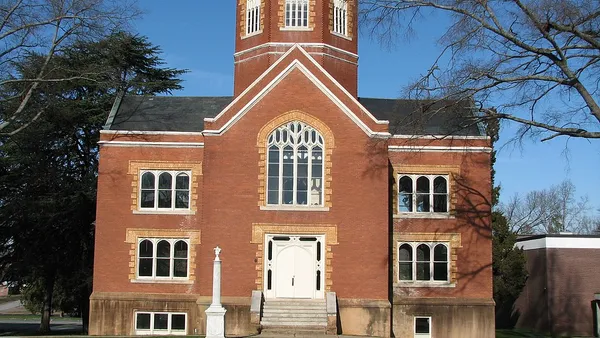Dive Brief:
- Fitch Ratings lowered its outlook for Anderson University, a private nonprofit in Indiana, from “stable” to “negative,” according to an emailed note Tuesday.
- In explaining the change, analysts with the credit rating agency pointed to the university’s reliance on temporary measures such as asset sales and “extraordinary” draws on its endowment to cover budget gaps in fiscal years 2023 and 2024, and for an expected deficit in 2025.
- In fiscal 2024, Anderson fell short of the debt coverage ratio stipulated in its bond terms, which puts the university at risk for a covenant default in 2025, Fitch noted. That could speed up its repayment obligations without accommodation from bondholders.
Dive Insight:
Like many smaller institutions, Anderson — founded in 1917 by the Indiana-based Christian denomination Church of God Ministries — has wrestled with declining enrollment and accompanying financial pressure in recent years.
Between 2017 and 2022, fall headcount dropped by 31.3% to 1,290 students, according to federal data. And that total is roughly half the 2,565 students enrolled at Anderson in fall 2010.
With declining student numbers, the university also suffered revenue declines. Tuition and fees brought in $2.8 million less in fiscal 2023 than in 2022, according to its financial reports. For the year ending May 2023, Anderson racked up a nearly $6.4 million operating loss.
To plug those gaps, Anderson has been selling off its assets, including a wellness center as well as the flagship building for an enterprise center it established. Its total assets fell from about $186 million in fiscal 2021 to $123.6 million in 2023. During that period, property holdings fell 29% to $56.6 million.
Fitch analysts describe Anderson’s student body as small and regional, but they also noted that first-year enrollment increased in fall 2023 and 2024. They noted “stable net student revenue, solid fundraising capacity, and strong community partnerships.”
The university carries more than $40 million in debt. Its bond covenants require Anderson to maintain an operating income equal to 1.1 times its debt obligations. The university fell short of this ratio in fiscal 2024, which forced Anderson to hire a consultant per the bond terms, Fitch analysts said.
Anderson could be in default if that ratio falls further, and if bondholders don’t provide a waiver. A default could accelerate the university’s timeline for repaying its bonds — putting yet more stress on its liquidity — though Fitch analysts view this scenario as “unlikely.”
Also pressuring the university, according to Fitch, is its aging campus. On average, Anderson's facilities are over 25 years old. A student feedback study found that “deferred maintenance could become a constraint to AU's competitive and financial position over time,” analysts noted.
Fitch’s lowered outlook for the university could signal credit downgrades in the future. For now, Fitch upheld its overall B- rating for Anderson, indicating that default risks exist but so do some safety margins.













